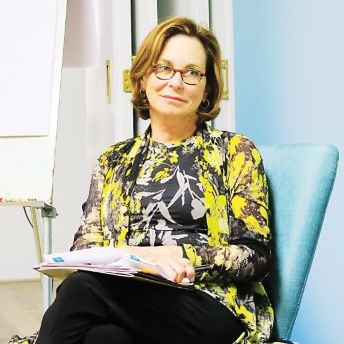click to dowload our latest edition
CLICK HERE TO SUBSCRIBE TO OUR NEWSLETTER


Published
4 years agoon
By
adminTALI FEINBERG
“The JDC is the 911 of the Jewish people. A total of 55 000 people will be helped by the JDC on any given day. If there are Jews in need, we will find a way to get to them,” says Betsy Sheerr, incoming Africa and Asia chairperson of the organisation, which is known colloquially as “the Joint”. She and her husband, Richard, were in Cape Town recently, where they addressed a small group of Jewish community leaders to begin building a stronger connection with the South African Jewish community and understand its needs.
The couple are originally from Philadelphia, but now reside in Florida. In their former city, they encountered some of the poorest Jews in America, where one in four lives below the poverty line. “There is a sense that Jewish poverty doesn’t exist, but it’s prevalent throughout the world,” says Sheerr.
The JDC is 105 years old, having been in existence before World War I. Its main aim is to “go out of business” in other words, no longer be needed. That’s a long way off, however, as it currently works in 70 countries, from Albania to China, Egypt to Kazakhstan, and Panama to Uzbekistan.
Thirty five percent of its budget goes towards Israel, and 35% to the former Soviet Union (FSU), where one will find “the poorest Jews in the world”. The rest of its funds are spread thinly throughout the globe.
Sheer says the organisation has three focus areas: rescue, relief, and renewal. “We’re there with the boots on the ground and know-how to take [people] out of harm’s way. We can be there at a moment’s notice, wherever needed,” she says.
For example, when the tsunami hit Japan in 2011, the country was unprepared. The JDC worked with the Jewish community there to offer immediate aid, and one member of the community was so impressed, he got involved and is now on the organisation’s board.
Renewal is equally important. For example, the JDC has been so successful in getting the Romanian community back on its feet, its assistance is no longer needed there. “We believe that the Jewish part of Jewish life is worth fighting for. That’s why we work hand-in-hand with communities around the world, empowering them to realise their own dreams and care for their most vulnerable,” says Sheerr. “Together, we build new generations of Jewish leaders.”
The organisation’s focus remains on the 86 000 elderly impoverished Jews in the FSU. “It’s across 11 time zones – the scope of this crisis is massive,” says Sheerr. “We ensure that they never have to choose between essentials like food and medicine, and we provide something invaluable – the knowledge that they aren’t forgotten, and remain part of a global Jewish community that will always have their back.”
Many of these people live alone and are “shut-ins” – they are physically unable to leave their apartment. The food, support, and medical assistance that the JDC provides literally keeps them alive. Many went through horrors during World War II, but aren’t officially classified as Holocaust survivors, so they don’t get aid from organisations that cater for Holocaust survivors. Sheer says they are able to identify these destitute Jews through extensive networks.
The organisation faces the dilemma of “what to do first”.
“If you focus only on immediate needs, how do you cultivate a Jewish identity and a Jewish future? But if you focus only on [the latter], how will people eat?” asks Sheerr rhetorically. The answer is that the JDC does its best to focus on both. Though it used to have offices across the globe, with a tight budget, its offices are now located in New York and Jerusalem,with smaller offices in Budapest, Kiev, Moscow, Buenos Aires, and Mumbai, with volunteers and staff travelling extensively.
Turning to Israel, Sheerr says that the country’s future demands that it addresses its most complex social challenges. “At JDC, we break the cycles of poverty among the most vulnerable. We foster inclusion and independence for the elderly and people with disabilities, and provide access to opportunities for all.” The JDC works closely with the Israeli government, the business sector, and nongovernmental organisations to create these solutions.
The JDC is there during natural disasters, “and we stay long after to make sure those communities get back on their feet. We also bring our expertise to slow-moving crises like the economic collapse in Venezuela,” says Sheerr. She provided the startling statistic that inflation in that country is at 10 000 000% as of November 2019. There are about 5 000 Jews still living there, from a community of 21 000 in its heyday.
Closer to home, Sheerr is interested to hear about the challenges faced by Jews in Zimbabwe, and the increase in the need for financial assistance and food banks in our own community. Hazel Levin, the director of Jewish Community Services in Cape Town, told her that the organisation is witnessing a dramatic rise in the need for food parcels and social interventions, and that it has even assisted homeless Jews living on the street. “About 10% of the Cape Town Jewish community is in need of our daily support,” says Levin.
Sheer says that although South African Jewry faces economic challenges and the spectre of a shrinking community, our level of welfare and supportive structures are impressive. She looks forward to learning more about our community, and working closely with us.
